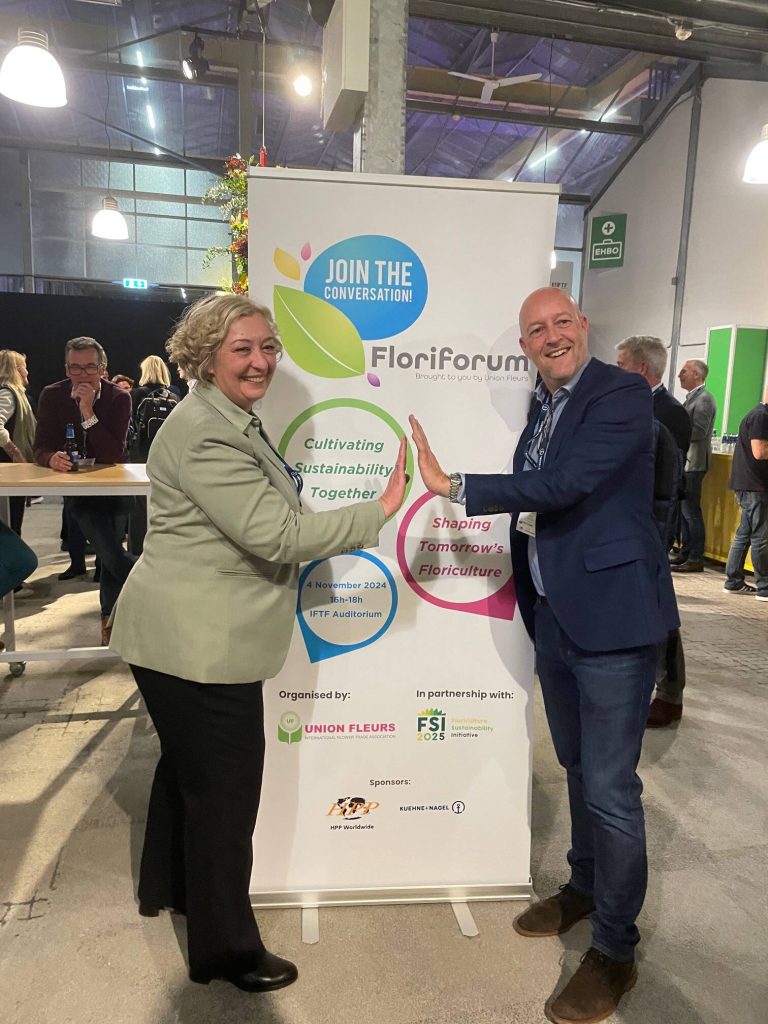On the eve of the IFTF show in the Netherlands, the international flower trade association Union Fleurs, in partnership with the Floriculture Sustainability Initiative (FSI), hosted its ‘Cultivating Sustainability Together – Shaping Tomorrow’s Floriculture’ themed Floriforum conference .

This year’s Floriforum, held at the EXPO Greater Amsterdam in Vijfhuizen, explored the future of sustainability within the global floriculture industry. The 245 attendees discussed the latest market dynamics and trends, the imperative for sustainability messaging to international buyers, and the need for a unifying narrative surrounding floriculture cultivation and trade to sustain the future of flowers and plants.
Following initial remarks by moderator Simone van Trier, Augusto Solano, president of Union Fleurs, noted that only 15 years ago, sustainability was not such a significant movement as it is today, where sustainability has become the norm.
In ornamental horticulture, sustainability began to gain steam in 2013 when the Floriculture Sustainability Initiative (FSI) debuted at the IPM Essen show. Eleven years later, the organiZation can look back and take pride in what has been achieved since.
Yet, more recently and on various occasions, the media, environmentalists, politics and society have condemned the flower industry over its contribution to climate change and use of pesticides, making the need for strategic narratives unifying the sector’s approaches, good practices and attitudes into a cohesive, positive message more urgent than ever.
Keynote speaker Jan van Dam, CEO of Dutch Flower Group, asked himself, “What can I do? and What can we do? while sharing the discomforting news of a Dutch minister who has openly questioned whether horticulture is receiving too much support in light of its environmental impact.
In France, an ex-florist has won a wrongful death lawsuit after her 11-year-old daughter tragically died from – what her lawyers sustain – pesticides on the flowers she worked with.
At the same time, a swath of studies confirm that flowers contribute to joy, positivity, mental health, and overall well-being at home and at work. So, flowers and plants also symbolize happiness and joy, and that’s something the industry can be proud of while it should continue to follow the path toward sustainability.
In the panel discussion, Yvonne Watzdorf, CEO of the Flower Council of Holland, unveiled the organization’s new mission and goals, explaining that a recent study found that 50 per cent of consumers think positively about the sector, 42 per cent are neutral, and 8 per cent have a negative opinion. Communication targeting the 42 per cent ‘neutral’ group is therefore essential, said Sibbe Krol, director of sustainability at Bloom & Wild Group, and Jan McNair, director of product and procurement at Interflora UK and head of sustainability at Interflora-Fleurop Global Flower Services.
The next speaker was Simon Derrick. He is the global head of sustainability at Blue Skies, which advocates for Fairmiles, an initiative backed by a consortium of organisations representing African fresh produce businesses, the air cargo industry (Air France KLM Cargo), academia, and the international development sector.
It calls for science-based Net Zero guidelines which balance social and economic impacts with the drive to reduce greenhouse gas emissions.
Fairmiles argues that in the absence of such guidelines, there is a significant risk that businesses adopt decarbonisation policies that overlook more comprehensive sustainability benefits and impacts, including climate justice implications for vulnerable communities within global supply chains.
James MacGregor is a development economist and co-author of the book entitled ‘Fair Miles: Recharting the Food Miles Map’. He explained the fresh produce sector’s situation and how transparency facilitates communication on the sector’s social and environmental actions. The book delves into the realities of the produce trade between Africa and the UK, examining both sides of the equation in search of a diet that is ethically and nutritionally balanced.
The audience’s reactions were quite thought-provoking. One comment highlighted the role of media, stating, “The media influences consumer opinions, but we as a sector have the responsibility to provide the media with real facts and positive elements.”
Another participant remarked, “Sustainability is important, but the value chain is highly fragmented. Are consumers ready to pay more for it?”
CC: floraculture
